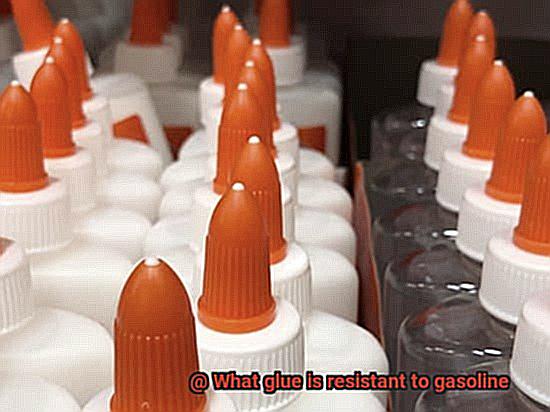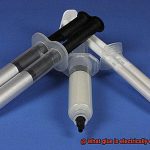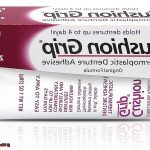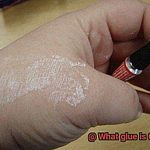Gasoline is the lifeblood of many vehicles, from cars and trucks to boats and motorcycles. But with its highly combustible nature, finding a glue that can bond materials in a gasoline-rich environment can be a daunting task.
Think about repairing a fuel tank or gas line only to have your adhesive fail under the intense pressure of gasoline. The consequences could be catastrophic. That’s why it’s crucial to find an adhesive that you can rely on when working with gasoline.
In this blog post, we’ll dive into the world of gasoline-resistant adhesives and explore their various applications. We’ll also discuss the features and benefits of these specialized glues, as well as their limitations.
From epoxy to cyanoacrylate, we’ll take a deep dive into each type of adhesive’s properties and effectiveness when it comes to resisting gasoline. Whether you’re a seasoned mechanic or a DIY enthusiast looking for a strong adhesive for your project, this post will provide you with all the information you need to make an informed decision.
So sit back, buckle up, and let’s explore the world of gasoline-resistant adhesives together. Your safety and project success depend on it.
What is Gasoline?
Contents
Gasoline is a vital fuel that powers our everyday lives, from cars to machinery and equipment. But what exactly is gasoline, and how does it work?
Gasoline is a liquid mixture of hydrocarbons, including carbon and hydrogen molecules. It is extracted from crude oil through a refining process that separates different components, including gasoline, diesel, and other fuels. Once extracted, the gasoline is further processed to remove impurities and meet specific requirements for use as a fuel.
When gasoline is burned in an engine, it produces energy in the form of heat and motion that powers vehicles and equipment. But this powerful fuel must be handled with care due to its highly flammable nature. Gasoline needs to be stored and transported in specialized containers designed to prevent leaks and spills that can cause harm to both people and the environment.
It is important to note that gasoline can have negative effects on the environment if not disposed of properly or in case of a spill. Gasoline spills can contaminate soil and water, harming plants and animals. Additionally, burning gasoline releases carbon dioxide into the atmosphere, contributing to climate change.
To reduce gasoline’s impact on the environment, it is crucial to use it responsibly and take necessary precautions when handling it. This includes using specialized adhesives like cyanoacrylate glue or polyurethane adhesive when repairing materials in applications where gasoline is present.
Why is it Important to Use Glue Resistant to Gasoline?
Gasoline is a powerful fuel that runs our vehicles and machines, but it’s also a highly combustible and flammable substance that requires careful handling. This is where the importance of using glue resistant to gasoline comes into play.
When equipment comes into contact with gasoline, using glue that is not resistant to it can lead to serious safety hazards and damage. Over time, the glue can break down and lose its adhesive properties, causing cracks and leaks in the equipment. These dangerous situations can lead to fires or explosions, putting people and the environment at risk.
Furthermore, broken-down glue can cause parts of the equipment to come loose, resulting in damage to machinery and posing a significant threat to those working nearby. The cost of repairs and maintenance can be staggering for individuals or businesses that rely on such equipment.
To avoid these hazards, it’s crucial to use glue that is resistant to gasoline. Such glue will not break down when exposed to gasoline, ensuring the safety of both people and machinery. Additionally, using such glue can be cost-effective in the long run by reducing frequent repairs and maintenance costs.
Common Glues Not Suitable for Use with Gasoline
When it comes to repairing machinery or vehicles using glue, it’s important to choose the right type of adhesive for the job. Not all glues are created equal, especially when it comes to gasoline. Some types of glue can break down or lose their adhesive properties when exposed to gasoline, which can be dangerous and costly. In this article, we’ll explore the common types of glue that are not suitable for use with gasoline.
First up is regular white glue or school glue. This type of glue is water-based and will easily dissolve or lose its adhesive properties when exposed to gasoline. Similarly, other water-based glues like PVA or craft glue should also be avoided when working with gasoline. These types of glue will break down quickly when in contact with gasoline, leaving you with a weak bond that won’t hold up over time.
Hot glue may seem like a quick and easy option for bonding materials together, but it’s not suitable for use with gasoline. Hot glue is made from thermoplastic adhesives that melt and harden quickly when heated. While this makes it great for certain projects, it can easily break down when exposed to gasoline and other harsh chemicals commonly found in automotive and machinery repair.
Cyanoacrylate or superglue may seem strong initially, but they can become brittle and lose their adhesive properties over time when exposed to gasoline. Similarly, epoxy and contact adhesives should also be avoided when working with gasoline. These types of glue will break down and lose their strength over time, leaving you with a weak bond that won’t hold up under pressure.
So, what type of glue should you use for projects involving gasoline? There are a few options:
- Silicone adhesive: This type of adhesive is resistant to gasoline and other chemicals commonly found in automotive and machinery repair.
- Polyurethane adhesive: This type of adhesive creates a strong bond that can withstand exposure to gasoline and other harsh chemicals.
- Acrylic adhesive: This type of adhesive is also resistant to gasoline and other chemicals, making it a good choice for automotive and machinery repair.
Specialized Adhesives Resistant to Gasoline
There are specialized adhesives available to help you out. These adhesives have been designed to resist harsh chemicals and are perfect for automotive and industrial applications.
One popular choice for gasoline-resistant adhesives is cyanoacrylate, also known as super glue. But hold up. Not all types of super glue are resistant to gasoline. To ensure your project is a success, look for a specialized formula designed specifically for use in automotive or industrial settings.
Epoxy is another adhesive that can handle exposure to gasoline and other chemicals. It has impressive bonding properties and can be used on a variety of materials, from metal to plastic. This makes it a popular choice in the automotive and industrial industries.
Polyurethane adhesives offer resistance to gasoline and other chemicals too. They create a strong bond between surfaces and are commonly used for sealing and bonding purposes in the automotive industry.
When selecting a specialized adhesive that is resistant to gasoline, it’s crucial to read the labels carefully. Ensure that the product has been specifically designed for use in automotive or industrial settings. Using a regular adhesive that is not resistant to gasoline can result in the bond breaking down and ultimately failing.
Cyanoacrylate Glue (Super Glue)
Look no further than cyanoacrylate glue, commonly known as Super Glue. This adhesive is renowned for its quick-drying properties and strong bonding capabilities. However, when it comes to applications involving gasoline, the effectiveness of cyanoacrylate glue may be limited.
Gasoline is a highly flammable liquid that can dissolve or weaken certain adhesives. While cyanoacrylate glue can withstand some exposure to gasoline, prolonged contact can cause it to break down and lose its adhesive strength over time.
There are specialized formulas of cyanoacrylate glue that are specifically engineered to withstand harsh chemicals and solvents like gasoline. Industrial-grade cyanoacrylate glue is the way to go if you’re working on projects involving gasoline or other harsh chemicals. These specialized adhesives are commonly used in automotive and manufacturing industries, where resistance to gasoline is essential.
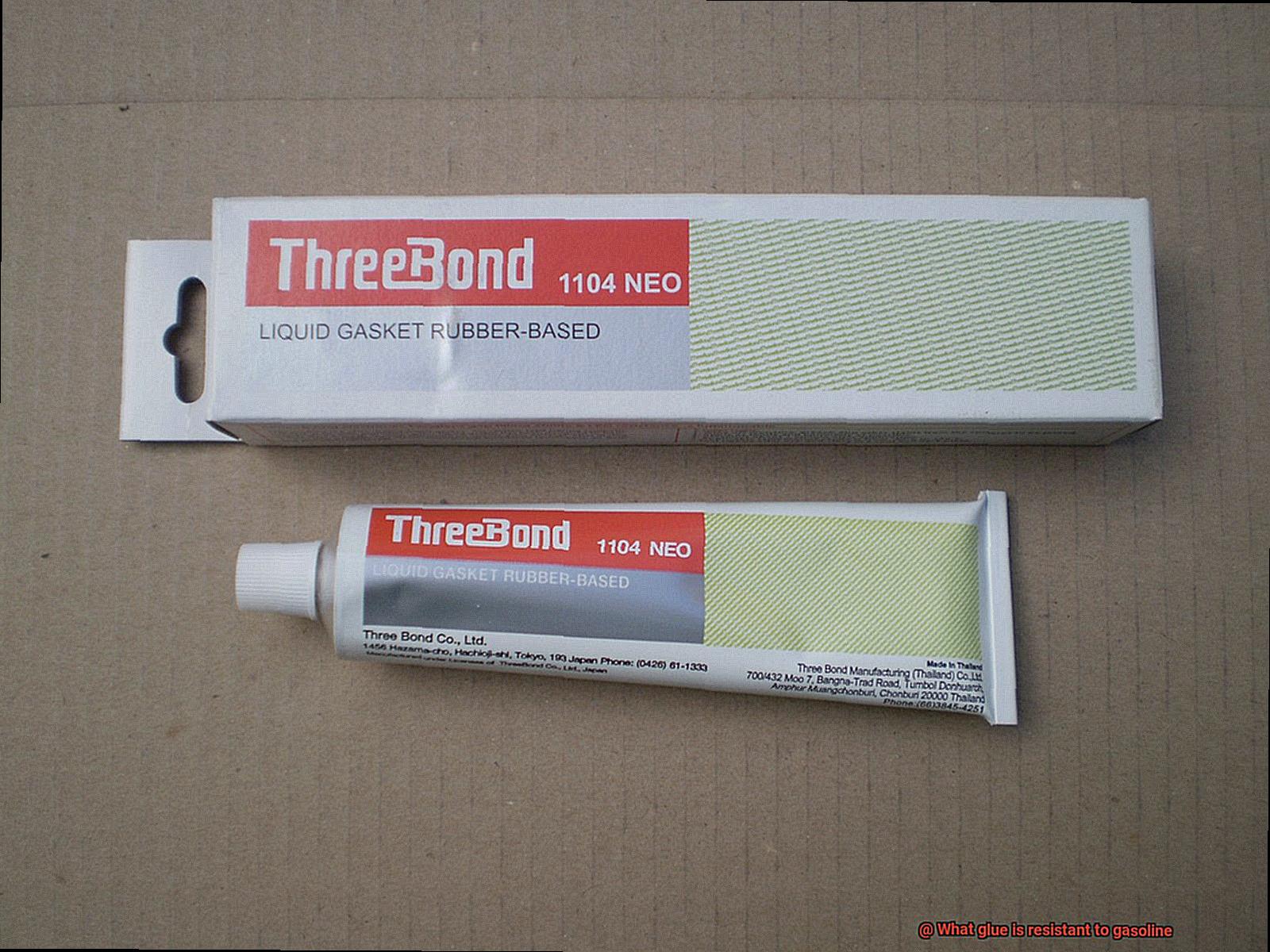
It’s crucial to choose the right adhesive for your project and prioritize safety when working with potentially hazardous materials. When it comes to bonding materials involving gasoline, always opt for industrial-grade cyanoacrylate glue or other specialized adhesives that are specifically designed for such conditions.
Polyurethane Adhesive
This two-part adhesive, made up of a resin and hardener, creates a powerful chemical reaction resulting in a strong and flexible bond. Its flexibility makes it perfect for applications that require movement or flexibility.
But that’s not all – polyurethane adhesive is also resistant to water, heat, and UV radiation, making it ideal for outdoor use or in environments where exposure to these elements is likely. It’s no wonder why it’s commonly used in the automotive industry for bonding parts that are exposed to gasoline and other chemicals.
However, it’s important to keep in mind that polyurethane adhesive may take longer to cure compared to other adhesives. It requires moisture from the air to cure properly, so it may not be the best option for applications that require fast curing times.
In the world of adhesives, polyurethane adhesive is a top contender for its impressive strength and durability. Its resistance to chemicals like gasoline and other elements make it a versatile choice for a wide range of applications.
Here are some key benefits of polyurethane adhesive:
- Strong and flexible bond
- Resistant to gasoline and other chemicals
- Resistant to water, heat, and UV radiation
- Ideal for outdoor use and environments with harsh elements
Tips for Choosing Glue Resistant to Gasoline
When it comes to choosing a glue that can withstand exposure to gasoline, there are several key factors to keep in mind. The first and most important consideration is to select a specialized adhesive that is specifically designed for use in environments where gasoline is present. This type of adhesive is made from chemicals that can resist the corrosive nature of gasoline and maintain their strength even in harsh conditions.
Another important factor to consider when selecting a gas-resistant glue is the material you will be bonding. Different materials require different types of glue, so it’s crucial to choose a product that is compatible with both the materials you’re working with and the gasoline or fuel they will be exposed to. For example, if you’re bonding metal surfaces, you’ll need a glue that is specifically designed for metal bonding.
When selecting a glue that is resistant to gasoline, it’s also important to evaluate its bond strength. Gasoline can be incredibly corrosive, so you need a glue that will create a strong, long-lasting bond that can withstand exposure to fuels and other chemicals. Look for a glue with high bond strength that can handle both tension and shear stress.
The application method is another critical factor to consider when choosing a gas-resistant glue. Some glues come in spray form, while others come in liquid or gel form. Consider the size and shape of the surfaces you are bonding and choose a glue that can be easily applied in those areas. Also, be sure to check the drying time and curing time of the glue you choose. Some adhesives dry quickly but take longer to fully cure and reach their maximum strength, while others may take longer to dry but have a shorter curing time. Choose a glue that fits your timeline and allows enough time for the bond to fully cure before exposing it to gasoline or other chemicals.
dA7gQpHv9vs” >
Conclusion
In summary, the importance of selecting the right glue that can withstand gasoline cannot be overstated. Gasoline is a highly combustible substance that requires careful handling to ensure safety and project success. Using an adhesive that is not resistant to gasoline can lead to disastrous consequences.
Unfortunately, many commonly used adhesives like white glue or school glue, water-based glues such as PVA or craft glue, hot glue, cyanoacrylate or superglue, and epoxy and contact adhesives are not suitable for use with gasoline. They tend to break down and lose their strength over time when exposed to harsh chemicals.
Thankfully, specialized adhesives like silicone adhesive, polyurethane adhesive, and acrylic adhesive have been specifically engineered to resist harsh chemicals like gasoline. These adhesives are perfect for automotive and industrial applications where exposure to gasoline-rich environments is common.
When selecting a gas-resistant glue, it’s essential to consider factors such as bond strength, material being bonded, application method used, drying time and curing time of the adhesive chosen. By taking these factors into account and choosing the right gas-resistant adhesive for your project needs, you can ensure safety while saving on repair costs in the long run.
Whether you’re a seasoned mechanic or a DIY enthusiast looking for a strong adhesive for your project involving gasoline-rich environments, this guide provides all the necessary information needed to make an informed decision.

